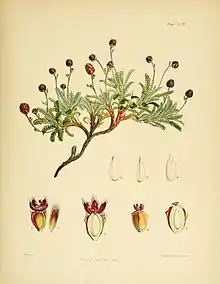| Acaena lucida | |
|---|---|
 | |
| Plate XCIV | |
| Scientific classification | |
| Kingdom: | Plantae |
| Clade: | Tracheophytes |
| Clade: | Angiosperms |
| Clade: | Eudicots |
| Clade: | Rosids |
| Order: | Rosales |
| Family: | Rosaceae |
| Genus: | Acaena |
| Species: | A. lucida |
| Binomial name | |
| Acaena lucida | |
| Synonyms[2] | |
Acaena lucida is a small plant in the Rosaceae family, which is native to southern Chile, southern Argentina and the Falkland Islands.[2]
Taxonomy and naming
Acaena lucida was first formally described in 1789 by William Aiton, as Ancistrum lucidum,[2][3] but was assigned to the genus, Acaena, by Martin Vahl in 1804.[2][1]
The genus name (Acaena) is derived from the Ancient Greek word akaina meaning "thorn" or "spine",[4] and refers to the spiny hypanthium of many species of Acaena. The specific epithet, lucida, is Latin (lucidus, -a, -um) which means "shining", "clear" or "transparent",[5][6] and in this instance was used by Aiton to mean "shining".[3]
References
- 1 2 Vahl, M. (1804) Enumeratio plantarum 1:296.
- 1 2 3 4 "Acaena lucida (Aiton) Vahl | Plants of the World Online | Kew Science". Plants of the World Online. Retrieved 9 January 2020.
- 1 2 Aiton, W. (1789) Hortus Kewensis 1: 15
- ↑ Brown, Roland Wilbur (1956). The Composition of Scientific Words. Washington, D.C.: Smithsonian Institution Press. p. 796.
- ↑ "lucidus,-a,-um". www.plantillustrations.org. Retrieved 10 January 2020.
- ↑ Stearn, W.T. (2004). Botanical Latin (4th ed). Timber Press, Oregon. p. 444. ISBN 9780881926279.
External links
- Acaena lucida occurrence data from GBIF
 Media related to Acaena lucida at Wikimedia Commons
Media related to Acaena lucida at Wikimedia Commons
This article is issued from Wikipedia. The text is licensed under Creative Commons - Attribution - Sharealike. Additional terms may apply for the media files.